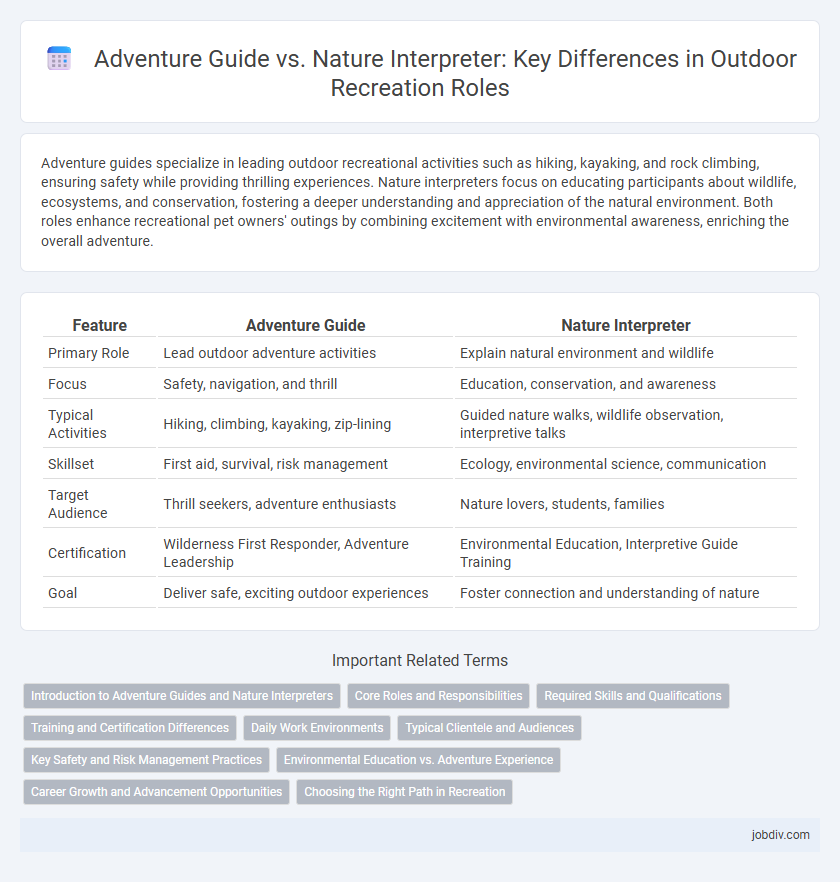Adventure guides specialize in leading outdoor recreational activities such as hiking, kayaking, and rock climbing, ensuring safety while providing thrilling experiences. Nature interpreters focus on educating participants about wildlife, ecosystems, and conservation, fostering a deeper understanding and appreciation of the natural environment. Both roles enhance recreational pet owners' outings by combining excitement with environmental awareness, enriching the overall adventure.
Table of Comparison
| Feature | Adventure Guide | Nature Interpreter |
|---|---|---|
| Primary Role | Lead outdoor adventure activities | Explain natural environment and wildlife |
| Focus | Safety, navigation, and thrill | Education, conservation, and awareness |
| Typical Activities | Hiking, climbing, kayaking, zip-lining | Guided nature walks, wildlife observation, interpretive talks |
| Skillset | First aid, survival, risk management | Ecology, environmental science, communication |
| Target Audience | Thrill seekers, adventure enthusiasts | Nature lovers, students, families |
| Certification | Wilderness First Responder, Adventure Leadership | Environmental Education, Interpretive Guide Training |
| Goal | Deliver safe, exciting outdoor experiences | Foster connection and understanding of nature |
Introduction to Adventure Guides and Nature Interpreters
Adventure guides lead outdoor excursions, specializing in activities such as hiking, climbing, kayaking, and camping while ensuring safety and navigation in diverse environments. Nature interpreters focus on educating participants about local ecosystems, wildlife, and cultural history, enriching the experience through storytelling and environmental awareness. Both roles enhance recreational activities by combining expertise in adventure skills with environmental knowledge to promote sustainable and engaging outdoor experiences.
Core Roles and Responsibilities
Adventure guides focus on leading clients through physical activities such as hiking, climbing, and kayaking, ensuring safety and providing technical expertise. Nature interpreters specialize in educating participants about the environment, wildlife, and ecological systems, enhancing appreciation and awareness of natural surroundings. Both roles require strong communication skills, but adventure guides prioritize risk management while nature interpreters emphasize environmental education.
Required Skills and Qualifications
Adventure guides require strong physical fitness, excellent navigation skills, and certifications in first aid and outdoor safety to lead participants through challenging terrains. Nature interpreters need in-depth knowledge of ecology, wildlife, and environmental science, along with skills in communication and educational techniques to engage and inform visitors effectively. Both roles demand strong interpersonal abilities and risk management expertise to ensure a safe, informative, and enjoyable outdoor experience.
Training and Certification Differences
Adventure guides typically require specialized training in outdoor skills, safety protocols, and first aid certifications such as Wilderness First Responder to manage high-risk activities. Nature interpreters often pursue certifications in environmental education, such as the Certified Interpretive Guide (CIG) program, emphasizing communication and ecological knowledge. The training for adventure guides centers on physical expertise and emergency response, while nature interpreters focus on educational methods and natural history understanding.
Daily Work Environments
Adventure guides typically operate in dynamic, outdoor settings such as mountainous trails, rivers, and forests, leading activities like hiking, rafting, or rock climbing. Nature interpreters work primarily in educational environments, including parks, nature centers, and visitor hubs, focusing on delivering informational programs about local ecosystems and wildlife. Both roles require adapting to variable weather conditions while engaging with diverse groups of participants to enhance outdoor experiences.
Typical Clientele and Audiences
Adventure guides typically serve thrill-seekers and outdoor enthusiasts seeking high-energy experiences like rock climbing, white-water rafting, and extreme hiking, often appealing to younger, physically fit adults and groups. Nature interpreters cater to families, school groups, and eco-tourists interested in educational, immersive experiences about local flora, fauna, and ecosystems, emphasizing conservation and environmental awareness. While adventure guides prioritize physical challenge and adrenaline, nature interpreters focus on enriching knowledge and fostering connection with natural habitats.
Key Safety and Risk Management Practices
Adventure guides prioritize safety by conducting thorough risk assessments, enforcing equipment checks, and leading participants through controlled environments to minimize hazards. Nature interpreters focus on educating visitors about environmental stewardship and safe behaviors in natural settings, emphasizing awareness of wildlife and terrain risks. Both roles require strong emergency response skills and adherence to protocols that protect both people and ecosystems during outdoor activities.
Environmental Education vs. Adventure Experience
Adventure guides prioritize thrilling outdoor experiences, leading activities such as rock climbing, rafting, and hiking to challenge participants physically and mentally. Nature interpreters focus on environmental education by explaining ecosystems, wildlife behavior, and conservation efforts to deepen visitors' understanding and appreciation of natural habitats. Both roles enhance outdoor recreation but differ in their emphasis on experiential adventure versus ecological knowledge.
Career Growth and Advancement Opportunities
Adventure guides often experience rapid career growth by acquiring certifications in specialized outdoor skills, enabling them to lead more challenging expeditions and expand into international markets. Nature interpreters benefit from advanced education in environmental science or ecology, opening doors to roles in park management, conservation projects, and educational program development. Both career paths offer distinct advancement opportunities: adventure guides excel through hands-on leadership and risk management, while nature interpreters grow by deepening scientific knowledge and community engagement.
Choosing the Right Path in Recreation
An adventure guide specializes in leading dynamic, physically engaging activities such as hiking, rock climbing, or rafting, ensuring safety while delivering adrenaline-fueled experiences. A nature interpreter focuses on educating participants about ecosystems, wildlife, and conservation, enriching outdoor experiences through storytelling and environmental knowledge. Choosing the right path in recreation depends on whether the priority is high-energy adventure or immersive natural education, tailoring the experience to personal interests and desired engagement levels.
Adventure Guide vs Nature Interpreter Infographic

 jobdiv.com
jobdiv.com